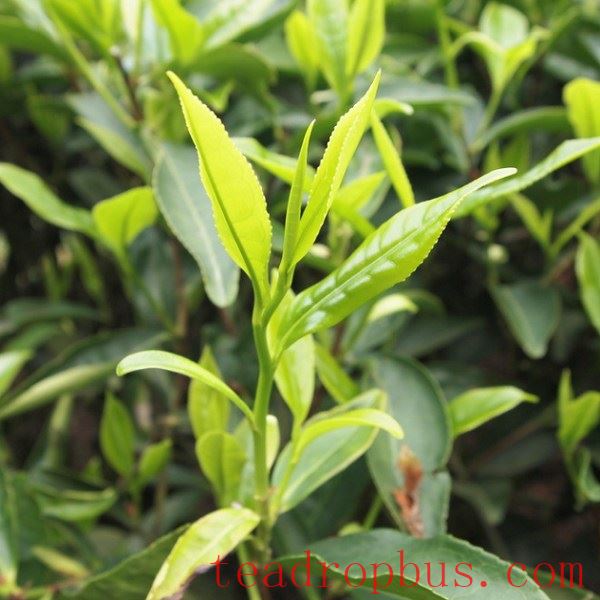
Basic Introduction to Qibei Tea
The Qibei Township of Xuanhan County has a long history of tea cultivation, processing, and distribution. Prior to the founding of New China, tea farmers from Bipaigou (the original name of Qibei Township) carried their tea to Xi Xiang (present-day Hanzhong City, Shaanxi Province). In recent years, two major tea brands, “Jiuding” and “Lvyuanchun,” have risen in prominence, becoming representative of Xuanhan's tea products and enjoying a certain degree of influence within the province and even nationwide (“Jiuding” series tea products won the “Gold Prize of the First Sichuan Ba Shu Food Festival” and the “Gold Prize of the Chengdu World Tea Expo”; “Lvyuanchun” series tea products received “ISO9001 International Quality System” and “ISO22000 Food Quality and Safety System” certifications).
The Qibei Township is an important base for tea development in the county, earning it the reputation of “Tea Town.” The township has over 8000 mu of tea plantations, producing 1.2 million catties of fresh leaves annually, 120,000 catties of dried tea, with a value of 6 million RMB, increasing the average income per farmer by 210 RMB. Currently, the “Jiuding Tea” produced in the township is a famous trademark in Sichuan Province, while “Lvyuanchun” is a provincial brand-name product.
Quality and Technical Requirements for Qibei Tea
I. Varieties
Fuding Dabai Tea, Mingshan 131 Tea, and other tea varieties approved for the production of Qibei Tea.
II. Site Conditions
An altitude of 600 meters or above within the designated production area, with a soil pH of 4.5 to 6.5, a soil layer thickness of ≥80 cm, organic matter content of ≥1.5%, and Selenium content of 0.25 mg/kg to 0.38 mg/kg.
III. Cultivation Management
1. Garden Construction: Slopes with a gradient of less than 15°, fertile soil, and deep layers, with a depth of cultivation of more than 60 cm.
2. Planting: Time is from early November to late March the following year. Single-row or double-row planting methods are used, with a density of 60,000 to 65,000 plants per hectare.
3. Fertilization: Predominantly farmyard manure, supplemented by organic fertilizers, with timely top-dressing based on soil characteristics and tea plant growth.
4. Environmental and Safety Requirements: Pesticide and fertilizer use must comply with national regulations without causing environmental pollution.
IV. Harvesting
1. Harvesting Time: Spring tea from early March to late May; autumn tea from early August to mid-October.
2. Harvesting Method: Manual harvesting.
3. Harvesting Standards: Harvest single buds to one bud with two leaves, avoiding rain-soaked, dew-soaked, purple, diseased, or insect-infested buds.
V. Processing Technology
1. Process Flow:
(1) Oven-Drying: Fresh leaves are spread out → fixation → cooling and moistening → rolling → second oven-drying → straightening → sieving → third oven-drying → final drying.
(2) Stir-Frying: Fresh leaves are spread out → fixation → cooling and moistening → rolling → second stir-frying → third stir-frying → final drying.
2. Process Requirements:
(1) Spreading: Spread out in a cool place, with a thickness of 1 cm to 4 cm, for 4 to 6 hours until the leaves become soft and the water loss rate reaches 25% to 35%.
(2) Fixation: Temperature of around 150°C to 180°C, until the moisture content is 55% to 65%.
(3) Rolling: Performed manually or using a rolling machine.
(4) Final Drying: Temperature of 60°C to 80°C for 1 to 1.5 hours, drying until the moisture content is ≤6.5%.
Product Characteristics
Known for its yellow-green luster, chestnut-like aroma, rich and sweet taste, clear yellow-green broth, and bright green leaf bottom, it is distinguished by its unique “three greens” feature. This is due to the favorable geographical, climatic, and soil conditions as well as traditional processing techniques. The tea contains fewer losses of tea polyphenols, Caffeine, vitamins, and other components, and is particularly rich in selenium, which is very beneficial to human health.
Awards and Honors
In 2002, Xuanhan County was awarded the title of “High-Quality Tea Production Base County” by the provincial agricultural department, and Qibei Township received the title of “Provincial Demonstration Township for Standardized Tea Planting.” Nowadays, Qibei Township has completed the certification for pollution-free Green Tea production bases with selenium-rich tea. “Qibei Tea” has successively obtained “Organic Product” certification, the title of “Sichuan Brand-Name Product,” “AAA” quality credit rating, the title of “Famous Trademark of Sichuan Province,” and gold and Silver prizes at the Ba Shu Food Festival.